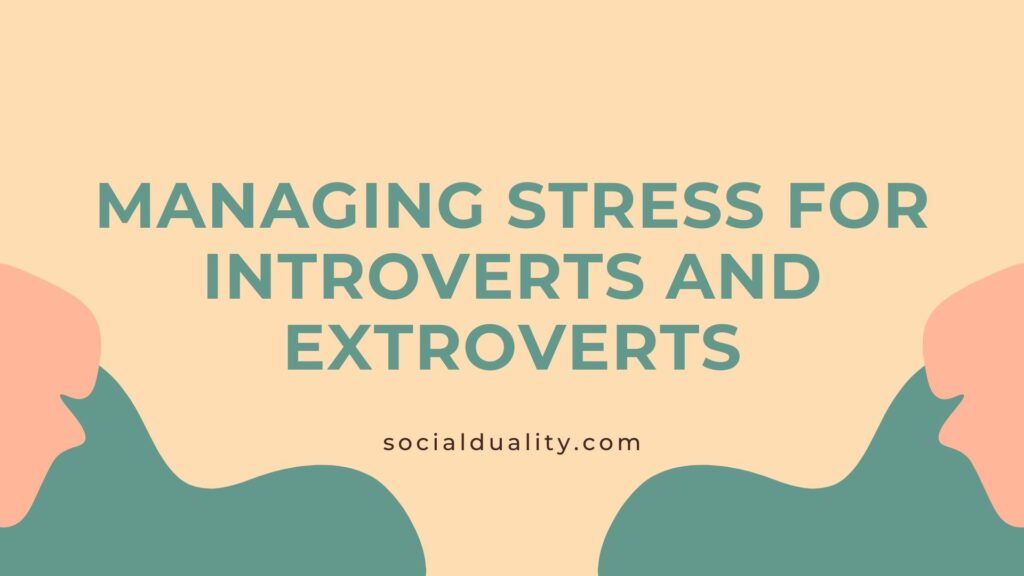In today’s fast-paced world, stress management is a skill we all need, but how you manage stress might depend a lot on whether you lean more towards introversion or extroversion. Introverts and extroverts process their environment and recharge in different ways, making their stress triggers and coping mechanisms unique. For introverts, social gatherings can be a significant source of stress, draining their energy and sometimes leading to feelings of loneliness and anxiety. They need quiet time to recharge and often benefit from practices like meditation and journaling. On the flip side, extroverts draw energy from being around others, yet too much alone time can leave them feeling stressed. They thrive on social engagement and physical activities that keep their energy levels up and stress at bay.
Both personality types face their own challenges when trying to create sustainable success in managing stress. It’s not just about finding one-size-fits-all stress management techniques; it’s about understanding what works for you. Whether it’s the deep introspection preferred by introverts or the lively social interactions that energize extroverts, recognizing your needs is the first step towards effective stress management. Incorporating positive psychology to foster positive emotions can also play a crucial role in building resilience against stress for everyone, no matter where they fall on the introversion and extroversion spectrum.
So, whether you’re an outgoing introvert or someone who thrives in social events, remember, managing stress is about more than just battling stressors head-on; it’s about tailoring your approach to fit your personality, helping you lead a balanced and fulfilling life.
Key Takeaways
In today’s fast world, learning how to manage stress is crucial for everyone. However, the way you tackle stress might really depend on if you’re more of an introvert or an extrovert. These two groups see the world in unique ways, and that includes how they handle the pressures of life.
- Introverts often feel drained by big groups and loud places. This can make social events a major source of stress for them. They find peace in quiet activities like meditation and journaling. These methods help them process feelings and find calm.
- On the other hand, extroverts get bored and stressed when they’re alone too much. They love to be around people and stay active. For them, the best way to deal with stress includes hanging out with friends or getting into a sport.
It’s all about figuring out what works for you. Introverts and extroverts can both benefit from understanding their own needs better. This isn’t just about fighting stress; it’s about finding balance in life.
- Remember, using positive psychology can help anyone build up more positive emotions. Whether you’re an outgoing introvert or love big social events, focusing on the good things in life can make a big difference.
So, next time you feel the weight of the world on your shoulders, think about what makes you feel better based on your personality. And don’t forget, it’s okay to mix things up. Sometimes, an introvert might enjoy a party, or an extrovert might find joy in a quiet afternoon with a book.

The Art of Managing Stress for Introverts
Mastering the craft of stress reduction tailored for introverts involves recognizing how social dynamics uniquely impact their stress levels. For introverts, the key lies in embracing solitary activities that replenish energy and calm the mind. Techniques such as meditation and journaling not only help in processing internal thoughts but also in creating a personal oasis of tranquility. Additionally, understanding and reframing thoughts can significantly lessen the impact of introvert stress. By crafting a serene environment and practicing self-kindness, introverts can navigate stressors more effectively. In our discussion on introvert-extrovert dynamics at work, we delve deeper into how introverts can leverage their innate qualities for stress management.
Unique Causes of Introvert Stress
Exploring the distinct triggers of introvert stress reveals insights into how they experience tension differently. Crowded settings and loud noises can quickly lead to sensory overload, disrupting an introvert’s peace. Additionally, the emotional sponge-like nature of introverts makes them susceptible to absorbing the moods around them, inadvertently amplifying their own stress. By pinpointing these unique stressors, introverts can better strategize their approach to stress management, focusing on techniques that cater to their preference for calm and solitude.
5 Effective Stress Management Techniques for Introverts
For introverts, managing stress effectively hinges on adopting strategies that align with their inner nature. Here are five methods to help introverts navigate stress:
- 1. Meditation enhances resilience by fostering inner peace.
- 2. Journaling provides a private outlet for emotional expression.
- 3. Reframing negative thoughts into neutral or optimistic ones aids in reducing stress.
- 4. Organizing one’s space creates a calming retreat.
- 5. Embracing self-compassion encourages acceptance of one’s introverted qualities. By integrating these practices, introverts can find solace and strength in their solitude, transforming how they handle stress.
How Extroverts Deal with Stress
Addressing how extroverts navigate stress involves diving into their preference for external stimulation. Unlike introverts, extroverts often find solace in engaging with others, making social engagement a crucial stress reliever. Physical activities and positive interactions with friends not only uplift their mood but also help in dissipating tension. Furthermore, extroverts thrive on structured activities, which provide them with a sense of accomplishment and joy. Expressing gratitude, a key aspect of positive psychology, enhances their overall well-being, making it an effective tool in their stress-relief arsenal. In our exploration of social strategies for introverts and extroverts, we uncover more about how these personality types can leverage their natural tendencies for better stress management.
What Causes Stress for Extroverts?
Identifying stress triggers in extroverts opens the door to better coping strategies. Unlike their introverted counterparts, extroverts may feel restless or down when spending too much time alone. They feel invigorated by the buzz of social activities; hence, lack of interaction can be a significant source of stress. Overstimulation, paradoxically, also poses a challenge, as balancing numerous social commitments can become overwhelming. For an in-depth analysis, one might explore findings on personality and stress reactions, as detailed in an article published in the Journal of Psychology here.

3 Proven Stress Management Techniques for Extroverts
Diving into effective strategies for extroverts to tackle stress, it becomes clear that engaging in lively discussions acts as a powerful outlet. Here’s a quick rundown:
- Engage in social activities: Share your thoughts and experiences with friends.
- Stay active: Physical exercises can be a fun way to release tension.
- Spend quality time: Enjoy moments with loved ones to uplift your spirits.
The Stress-Introversion-Extroversion Spectrum
Navigating the spectrum between introversion and extroversion reveals unique stress triggers and coping strategies. Introverts often feel drained by social events, craving solitude to recharge, while extroverts thrive on interaction, finding too much alone time stressful. Tailoring approaches to stress based on these personality aspects is crucial. For instance, introverts might find solace in meditation, whereas extroverts could benefit from engaging in group activities. Recognizing these differences enables individuals to implement effective stress reduction techniques, enhancing their overall well-being and ability to manage stress levels efficiently.
Misconceptions about Introverts, Extroverts, and Stress
Debunking common misunderstandings about how introverts and extroverts experience stress sheds light on the need for personalized coping mechanisms. While introverts might feel overwhelmed in bustling environments, leading to introvert stress, extroverts could find solitude equally taxing. Embracing activities that align with their energy levels—like meditation for introverts and social interactions for extroverts—proves beneficial. Recognizing these distinct needs helps in applying the most effective stress management techniques for each personality type.
| Factor | Introverts | Extroverts | Stress Management Tips |
|---|---|---|---|
| Social Setting | Prefers quiet, solo activities | Enjoys lively, group interactions | Tailor activities to energy levels |
| Energy Source | Recharges in solitude | Energizes around others | Acknowledge personal recharge methods |
| Stress Trigger | Overstimulation in crowds | Lack of social interaction | Identify and address key stressors |

Exploring the Role of Personality in Stress Management
Delving into how personality shapes stress coping mechanisms, we find that the essence of handling pressure varies significantly between introverts and extroverts. For introverts, introvert stress emerges from crowded settings, necessitating time alone to recuperate. Techniques like meditation and journaling can be sanctuaries for them. On the flip side, engaging in lively discussions acts as a balm for extroverts, helping them to unwind. Tailoring approaches to fit these personality dimensions ensures that each individual can navigate their stress landscape more effectively. Our exploration into introversion and extroversion further illuminates this distinction, offering deeper insights into personalized stress alleviation strategies.
How Personality Type Influences Stress Levels
The connection between an individual’s personality type and their stress levels reveals that coping strategies should be uniquely suited. For those leaning towards introversion, the hustle of daily life might be overwhelming, suggesting a need for quiet and reflection to alleviate introvert stress. Conversely, individuals with a dynamic social ability find solace in interaction, which counters their stress. Recognizing these differences is essential for developing effective personal stress reducers. In our article on introverts and extroverts communication styles, we delve into how understanding one’s social preferences can enhance stress management.
Tailoring Stress Management Solutions to Personality Types
Customizing stress management strategies for introverts involves embracing solitude-enriched activities, like meditation and journaling, which allow them to process emotions and recharge in peace. Meanwhile, individuals with a social ability to thrive in group settings might find discussing their concerns and engaging in active group pursuits more beneficial. This tailored approach acknowledges that while introverts might seek refuge in quiet, reflective practices, their counterparts find relief in shared experiences and dynamic interactions, underscoring the importance of aligning stress-reduction methods with personal preferences to effectively address the source of stress.

The Key to Sustainable Success: Balanced Stress Management
To optimize stress management for introverts, incorporating time for reflective practices is pivotal. For instance, transforming a corner of their living space into a calm retreat can significantly reduce introvert stress. It’s not about avoiding social situations but about balancing them with sufficient downtime. Similarly, understanding that introverts tend to absorb emotions makes it crucial for them to select social environments that uplift rather than drain. Embracing these tailored strategies can lead introverts to not only manage but also thrive amidst stress, paving the way for a balanced approach to challenges.
The Role of Positive Psychology in Stress Management
Exploring the impact of positive psychology on stress reveals how cultivating an optimistic outlook can significantly bolster coping strategies for both introverts and extroverts. For introverts, embracing solitude to reflect and meditate can enhance resilience. Conversely, extroverts might find solace in expressing gratitude and engaging in meaningful conversations, leveraging their social ability. Tailoring these practices according to one’s personality ensures a more effective approach to stress management, making every moment count in the journey towards well-being. A notable figure in this field, Rachel Goldman, emphasizes the importance of these tailored strategies (Rachel Goldman).
Leveraging Social Abilities for Effective Stress Management
Harnessing social skills to tackle pressure effectively is a nuanced strategy, especially when considering how introverts deal and their counterparts process tension. For those who prefer solitude, small yet impactful interactions can serve as powerful stress relievers, allowing them to conserve energy while still fulfilling their social needs. Conversely, individuals more attuned to external stimulation may seek varied and frequent engagements to uplift their spirits. Recognizing and adapting to these inherent tendencies not only enhances stress resilience but also contributes to millennials’ efforts to forge lasting well-being practices.
Conclusion
Understanding how to manage stress based on whether you’re an introvert or an extrovert can feel like unlocking a secret level in a video game. It’s all about playing to your strengths and knowing which boss battles (stressors) are yours to fight. For introverts, it’s like having a cozy, quiet fortress where you can retreat, meditate, jot down your thoughts, and tidy up your space. It’s about turning inward and treating yourself with the same kindness you’d offer a good friend.
Extroverts, on the other hand, thrive on the energy of the crowd. They’re the ones who recharge by getting into the mix, whether it’s a heart-pumping workout with a buddy or planning the next big adventure. They’re at their best when they’re out and about, sprinkling gratitude like confetti at a parade.
But here’s the kicker: stress doesn’t care if you’re an introvert or an extrovert. It’ll crash your party either way. That’s why understanding these differences is more than just fun facts for a personality quiz; it’s crucial for crafting a stress management strategy that feels as natural as your own skin. Whether you need solitude or the buzz of a crowd to recharge, embracing your unique approach to stress is your secret weapon. And remember, in the end, we’re all on this stress-busting journey together, introverts and extroverts alike, each bringing our own flair to the fight.
FAQ
- What are some main stress triggers for introverts and extroverts?
Introverts often feel stressed by social gatherings and loud environments. They might also pick up on others’ moods. Extroverts, on the other hand, might get stressed from too much alone time or not enough social interaction. - Can introverts and extroverts use the same techniques to manage stress?
While some techniques can benefit both, it’s usually best to tailor stress management to fit one’s personality. Introverts may prefer meditation or journaling, and extroverts might find relief in being active or hanging out with friends. - Why is it important to consider personality when dealing with stress?
Because introverts and extroverts process the world differently, what helps reduce stress for one might not work for the other. Recognizing this can lead to more effective stress management strategies. - How can positive psychology help with stress?
Techniques from positive psychology, like focusing on gratitude, can help both introverts and extroverts build resilience against stress. It encourages looking at the brighter side of life. - Are there any misconceptions about how introverts and extroverts handle stress?
Yes, a big misconception is that introverts are antisocial and extroverts are always happy. Both personality types can face stress but handle it in their unique ways. Understanding this helps in offering better support.


